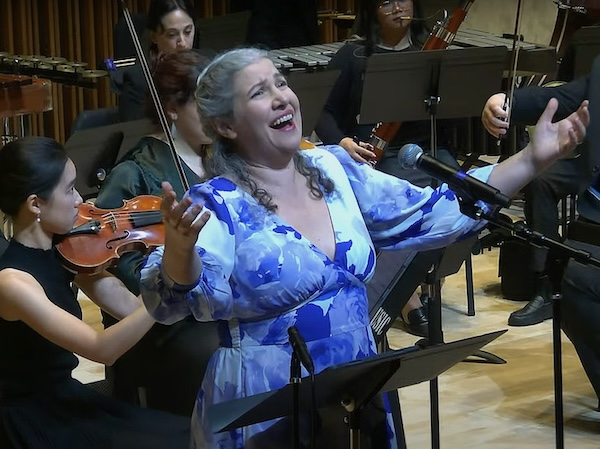Music of Chen Yi and McLoskey strike sparks with Ensemble Ibis

Maren Montalbano was the soloist in Lansing McLoskey’s One Book Called Ulysses, performed by Ensemble Ibis Saturday night at the UM Frost School of Music.
One of the defining human traits is the ambition to attempt the impossible. We do things because we can imagine them, no matter how fantastical they may be, and because we’re at least curious about how we might pull it off. And what would it be like if we could?
That’s a way to look at making music out of James Joyce’s Ulysses, one of the greatest novels in English literature and one of the great modernist works across all mediums. Which is what composer Lansing McLoskey did with his 2022 work, One Book Called Ulysses, commissioned by Network for New Music, the Barlow Endowment, and the Musical Fund of Philadelphia for the 100th anniversary of Joyce’s novel.
That was the headline work on a colorful, intriguing Ensemble Ibis concert played Saturday night at the Frost School of Music (viewed via livestream).
One Book Called Ulysses was the second of two works. The first was Chen Yi’s Sparkle, in an arrangement Stefan Freund made for Alarm Will Sound. Chen has described the idea behind the piece as wanting to “express my impressions of sparks—everlasting flashes of wit, so bright, nimble and passionate,” and put that together with a traditional eight-beat Chinese musical structure.
The result is music that comes in quick bursts and that initially feels like a prelude before the accumulation of pointillist details fills in an unexpected, but coherent, picture. That comes from Chen’s subtle, sophisticated writing and on Saturday night, the vivid and agile playing from Ibis and the detailed, energetic conducting of the ensemble’s director Shawn Crouch.
Some combination of the composing and the vitality and sensibility of the young musicians produced a sound and experience of excellent cartoon music. There were dazzling bursts of energy and quick changes of action and mood. The leanness in the scoring had a Giacometti-like pressing to the edge of lines and expressive ideas, like there was a seriousness underneath the sense of fun. The music rose to an intense climax than evaporated in a quick puff of smoke, like the remnants of fireworks.
Joyce made the ordinary profound through the genius of his language, so of course turning his writing into music requires a voice. For McLoskey’s piece, that was mezzo-soprano Maren Montalbano. She was superb, so fine that it was difficult to separate the quality of her own artistry from the quality of the composing.
For text, McLoskey used a mix from Ulysses itself—like the famous “Love loves to love love” for the second moment of the music—excerpts from the transcript of the obscenity trial over the book, some of Joyce’s correspondence, and the inspiration of the well-known photograph of Marilyn Monroe reading the novel.
There was also a QR code in the program that McLoskey directed the audience to in his opening remarks. He asked people to bring out their mobile phones to read the code for the conclusion of the piece as it would direct them to a choice of sound files to play, turning the audience into an ambient extension of Ibis for the concluding “Penelope’s Sirens.”
If this all seems like pinpoint details outlining tiny segments of an enormous whole, that was the music’s effect. There is simply too much in the novel—and the history and culture surrounding it—to channel through music. But there was also the question of whether such an impossible task could succeed by concentrating details in music that could somehow channel the experience of Joyce.
The answer Saturday night was no, but that didn’t make this bad. With Montalbano’s lovely sound, her tasteful portamento, the feeling that she was expressing things from the gut, this was still an enjoyable musical experience. The text settings are clear, with only a few modernist intervallic clichés, the instrumental accompaniment is lean and well made, and the singing and ensemble playing gradually built to a satisfying feeling of lyricism and expression. This was hollowed out by the more self-conscious meta-narrative of trying to produce an argument about Joyce and the novel. But if one just listened to this as pure music, it was often a real pleasure.
Posted in Performances
Leave a Comment
Sun Oct 6, 2024
at 3:05 pm
No Comments
